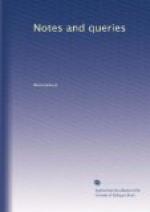“Papa brevis vox est, sed virtus
nominis hujus
Perlustrat quiequid arcus uterque tenet.”
Galfridus evidently derived his surname from his treatise on vines and wine; and he has been singularly unfortunate in the epithet, for I have never seen VIN-SAUF correctly printed. It varies from “de Nine salvo” to “Mestisauf.” Pits and Oudin call him “Vinesalf” and Fabricius and Mansi change him into “Vine fauf.”
The question now remains, Are the Roman Pontiffs and their Church answerable for the toleration of such language? Uncertainty may on this occasion be removed by our recollection of the fact, that a “Censura” upon the glosses of the papal canon law, by Manriq, Master of the Sacred Palace, was issued by the command of Pope Pius V. in 1572. It was reprinted by Pappus, Argent. 1599, 12mo., and 1609, 8vo., and it contains an order for the expurgation of the words before quoted, together with the summary in the margin, “Papa nec Deus est nec homo,” which appears in every old edition; for instance, in that of Paris, 1532, sig. aa. iij. So far the matter looks well, and the prospect is not hopeless. These glosses, however, were revised by another master of the Apostolic Palace, Sixtus Fabri, and were edited, under the sanction of Pope Gregory XIII., in the year 1580; and from this authentic impression the impious panegyric has not been withdrawn. The marginal abridgment has, in compliance with Manriq’s direction, been exterminated; and this additional note has been appended as a palliative:—
“Haec verba sano modo
sunt accipienda: prolata enim sunt ad
ostendendum amplissimam esse
Romani Pontificis
potestatem.”—Col.
4. ed. Paris, 1585.
R.G.
Poeta Anglicus (Vol ii., p. 167).—I cannot answer J.B.’s Queries; but I have fallen upon a cross scent, which perchance may lead to their discovery.
1. Ioannes Pitseus, de Scriptor. ad ann. 1250, (Relat. Histor. de Rebus Anglicis, ed. Par. 1619, p. 322.), gives the following account “de Michaele Blaunpaino:”—
“Michael Blaunpainus, vulgo Magister cognominatus, natione Anglus, patria Cornubiensis, ... missus Oxonium, deinde Parisios, ... prae caeteris se dedidit elegantiae linguae Latinae, fuitque inter praecipuos sui temporis poetus per Angliam potissimum et Galliam numeratus. Hunc subinde citat Textor in Cornucopia sub nomine Michaelis Anglici.... In lucem emisit: Historiarum Normanniae, librum unum: Contra Henricum Abrincensem versu. librum unum. Archipoeta vide, quod non sit. (MS. in Bibliotheca Lunleiana.) Epistolarum et carminum, librum unum. Claruit anno Messiae 1250, sub Henrici tertii regno.”
2. Valerius Andreas, however, gives a somewhat different account of Michael Anglicus. In his Biblioth. Belg. ed. 8vo. Lovan, 1623, p. 609., he says:
“Michael Anglicus, Bellimontensis,
Hanno, I. V. Professor et
Poeta, scripsit:




